Besieged Ukrainians endure bombardments, with no breakthrough in talks
6 min readLVIV, Ukraine/ANTALYA. Hundreds of thousands of civilians remained trapped in Ukrainian cities on Thursday, sheltering from Russian air raids and shelling as talks between Ukraine and Russia's foreign ministers made little apparent progress.
With Russian President Vladimir Putin's war in Ukraine entering its third week, officials in Mariupol said Russian warplanes again bombed the encircled southern port city where a maternity hospital was pulverised on Wednesday.
Ukrainian President Volodymyr Zelenskiy said Ukrainian authorities had managed to evacuate almost 40,000 people from the cities of Sumy, Trostyanets, Krasnopillya, Irpin, Bucha, Hostomel and Izyum, but Deputy Prime Minister Iryna Vereshchuk said not a single civilian was able to leave Mariupol on Thursday as Russian forces failed to respect a temporary ceasefire to allow evacuations.
Efforts to send food, water and medicine into the city failed when Russian tanks attacked a humanitarian corridor, Zelenskiy said.
"This is outright terror ... from experienced terrorists," he said in a televised address.
Russia's defence ministry said earlier that it would declare a ceasefire on Friday and open humanitarian corridors from Mariupol as well as Kyiv, Sumy, Kharkiv, Mariupol and Chernihiv.
Russia's invasion of Ukraine has so far failed to reach its stated objectives, but has caused thousands of deaths and forced more than 2 million people to flee Ukraine, where several cities are under siege.
It has also hit the world's economy, still emerging from the effects of the coronavirus pandemic.
International Monetary Fund Managing Director Kristalina Georgieva said the war and the massive sanctions imposed on Russia as punishment have triggered a contraction in global trade and sent food and energy prices sharply higher, which will force the IMF to lower its global growth forecast next month.
She said she expected mounting pressure on Russia to end the war, given the spillover effects it is having on economies globally.
US Treasury Secretary Janet Yellen told a CNBC on Thursday that a further rise in US inflation as Russia's invasion of Ukraine propels energy and other commodity costs higher.
Putin, facing global condemnation and increasingly isolated, said Russia would emerge stronger after overcoming the difficulties caused by the sanctions.
He told a government meeting there had been no alternative to what Russia calls its special military operation in Ukraine.
"There are some questions, problems and difficulties but in the past we have overcome them and we will overcome them," he said.
No breakthrough
Russian Foreign Minister Sergei Lavrov and Ukraine's Dmytro Kuleba met in Turkey in the highest-level talks since Putin ordered the invasion on Feb. 24.
Kuleba said afterwards that Lavrov had refused to promise to hold fire to allow aid distribution and the evacuation along humanitarian corridors of civilians trapped in Mariupol and elsewhere.
Lavrov showed no sign of making any concessions, saying the operation was going to plan and repeating Moscow's accusations that Ukraine posed a threat to Russia, which wants Kyiv to drop any aspirations of joining the NATO alliance.
A ceasefire was not meant to be on the agenda at Thursday's talks in Antalya, Lavrov added.
While there was no apparent progress towards a ceasefire, analysts said the fact the ministers were even meeting left a window open for ending the war.
The road ahead for any negotiation would be difficult, but Moscow's slower-than-expected military progress and the stinging cost of sanctions had potentially opened an opportunity for a compromise, they said.
In Washington, Central Intelligence Agency director William Burns said Putin did not appear to have a "sustainable" end-game in Ukraine and might soon try to find a way to end the fighting.
Others, however, cautioned that Putin could still seek to escalate.
"We have moved the dial for the process from zero to at least having the possibility for a discussion. But the indications of troop movements toward Kyiv may indicate that the worst may still be ahead of us," said Jonathan Eyal at the Royal United Services Institute in London.
A senior Ukrainian official said on Thursday that Russian planes bombed an institute in the city of Kharkiv that is home to an experimental nuclear reactor. The official said a hostel near Institute of Physics and Technology was on fire.
The Interfax Ukraine news agency said the fire service was extinguishing a blaze in a five-story hostel which covered a total of 100 square metres (1,100 square feet).
Reuters could not immediately verify the reports.
The Ukrainian parliament's official website had earlier said fighting close to the institute was continuing.
Russian forces last week captured the nuclear power station at Zaporizhzhia after an attack during which an adjacent training facility was set on fire.
Earlier, the UN nuclear watchdog said Ukraine had told it on Thursday it has lost all contact with the radioactive waste facilities at Chernobyl next to the defunct power plant at the site of the world's worst nuclear accident in 1986, which is now held by Russian forces.
Evacuation convoys
Attempts to send aid and evacuation convoys have failed for six days.
Aid agencies say humanitarian help is most urgently needed in Mariupol, where residents are running out of food, water and power. Its capture would allow Russia to link up pro-Moscow enclaves in the east and Russian-annexed Crimea to the south.
Mariupol mayor Vadym Boychenko said 400,000 people were trapped in the city which had gone through "two days of hell." "Every 30 minutes planes arrived over the city of Mariupol and worked on residential areas, killing civilians - the elderly, women, children," he said in an online post.
Petro Andrushenko, an adviser to the mayor, said the Russians wanted to "delete our people. They want to stop any evacuation."
Lavrov said the hospital struck on Wednesday had stopped treating patients and had been occupied by Ukrainian "radicals".
Russia's Defence Ministry later denied having bombed the hospital, accusing Ukraine of a "staged provocation" there.
White House spokesperson Jen Psaki called the hospital attack "horrific" and "barbaric," and said Washington was reviewing Russia's actions for possible war crimes, following similar remarks by European Commission President Ursula von der Leyen.
Lavrov accused Western countries of inflaming the situation by arming Ukraine.
Asked if the conflict could lead to nuclear war, he said: "I don't want to believe, and I do not believe, that a nuclear war could start."
Russia says its offensive is aimed at disarming its neighbour and dislodging leaders it calls neo-Nazis. Kyiv and its Western allies say this is a baseless pretext to invade a democratic country of 44 million people.
Refugee trauma
The pounding of Mariupol underscored US warnings that the biggest assault on a European state since 1945 could become increasingly attritional.
Half of the more than 2 million refugees from Ukraine are children, and the International Committee of the Red Cross said houses had been destroyed all across Ukraine.
Many refugees are suffering physical injuries and psychological trauma.
At the Polish border, Valera, a carpenter in his 50s, watched nervously as his daughter Anna, 24, who has cerebral palsy, was carried on a stretcher.
It was two days since they had left the eastern city of Kharkiv, where Anna broke her leg as they ran to a bomb shelter.
"There is positional fighting during the day, air raids in the evenings, they are shelling from everything," Valera said. "The centre (of Kharkiv) is ruined."
Zelenskiy's chief economic adviser Oleg Ustenko told an online event at least $100 billion worth of Ukrainian infrastructure, buildings and other physical assets had been destroyed. He said 50% of businesses had shut down completely and the other half were operating well below capacity.
For the latest news, follow us on Twitter @Aaj_Urdu. We are also on Facebook, Instagram and YouTube.
















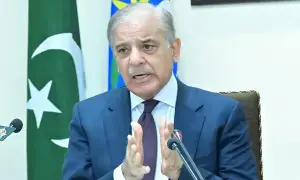
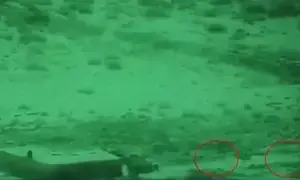




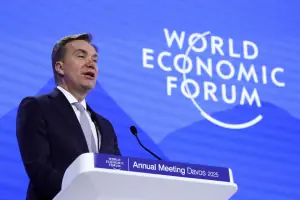
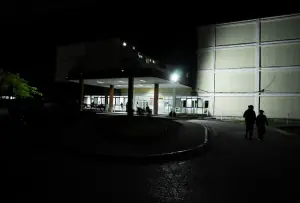

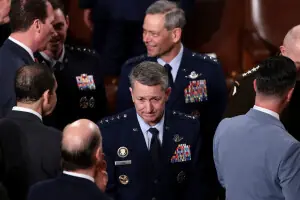

Comments are closed on this story.